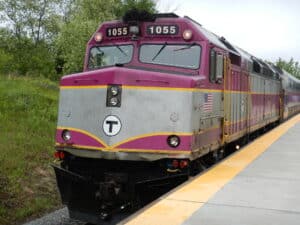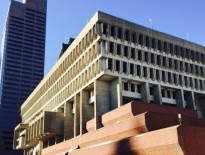
An MBTA commuter rail train waits at a station in 2019. Photo by Paul Morris | Flickr / CC BY-SA 2.0
Significant MBTA service cuts will hit early next year after the agency’s oversight board voted 3-2 in favor of a reduced package of cuts Monday afternoon, capping off months of planning and public outcry.
The Fiscal and Management Control Board approved virtually all of the changes that T staff proposed, making only a handful of tweaks aimed at keeping some commuter rail service after 9 p.m. possible, setting an early March 2021 target date for determining if the agency needs to reverse the service cuts and ensuring that fare hikes will not factor into upcoming T budget deliberations.
FMCB members Joseph Aiello, Monica Tibbits-Nutt and Brian Lang voted in favor of the plan, while members Chrystal Kornegay and Tim Sullivan voted in opposition.
All five board members were appointed by Gov. Charlie Baker, whose administration oversees the MBTA.
The changes aim to trim spending in fiscal year 2021 while the agency decide how to address a fiscal 2022 budget deficit inflicted by the pandemic’s impact on ridership. The long-term outlook remains unclear, and officials plan to discuss in February and March whether to keep cuts in place, expand them or reverse them in the next fiscal year.
Transit advocates and business groups criticized the plan as a short-sighted effort that could hurt the state’s economy by taking effect after a vaccine has started to arrive and warned they could lead to more congestion by encouraging more people to use their cars instead of transit.
“I do not see what the T is proposing as anywhere close to a doomsday scenario,” Transportation Secretary Stephanie Pollack said. “This is a service adjustment, which is providing more than adequate service for the number of riders we have and expect to have for the remainder of the current fiscal year.”
Jen Benson, a former state representative and president of the Alliance for Business Leadership, said Monday evening that the cuts “will set us back in our efforts to make our transit systems more accessible and equitable.”
“Despite assurances from MBTA leadership, these cuts will be difficult to reverse and will alter the commutes of thousands of people, pushing more of them away from public transit and into cars,” Benson said in a statement. “Many commuters, including essential workers, will be stranded without late-night and weekend commuter rail service, and more riders will be crowded onto fewer subway cars. With today’s news that the first COVID-19 vaccines are being administered in the U.S., we should be preparing for the recovery to begin, not surrendering our public services to the pandemic.”
Final Package Limits Cuts
Under the plan, unveiled and approved Monday, the T will halt weekend commuter rail service on all but five lines starting in January, as well as reduce Hingham and Hull ferry service and cut all Charlestown and Hingham direct ferry service to Boston.
Weekend service will remain available, but less frequent, on the Worcester, Providence, Newburyport/Rockport, Middleboro and Fairmount Lines, which officials say together represent about two-thirds of the commuter rail’s COVID-era weekend ridership.
Other major changes will hit in March: 20 bus routes will be eliminated; frequency will drop 20 percent on non-essential bus routes and 5 percent on essential bus routes; gaps between Red, Orange and Green Line trains will increase 20 percent; Blue Line trains will run up to 5 percent less frequently; and more commuter rail cuts will arrive, including possible reductions in service after 9 p.m.
Board members added three amendments to the package before approving it. One, suggested by Aiello, changed the original language eliminating weekday commuter rail service after 9 p.m. to a less severe — and more vague — adjustment of schedules “to optimize span of service.”
Another, offered by Tibbits-Nutt and approved unanimously, requires the FMCB to determine by March 15, 2021 if it needs to expand service in the final months of fiscal 2021 to respond to growing demand.
The third and final amendment bars the board or whatever entity succeeds it when its authority expires next year from increasing bus and rapid transit fares before service hours and ridership numbers return to pre-pandemic levels.
MBTA leaders had not planned on proposing fare increases as part of the fiscal year 2022 budget process, but the amendment from Lang more forcefully blocks that route. Kornegay and Sullivan voted against it, voicing concerns with the dynamic of setting orders for the body that follows the FMCB.
Beacon Hill Criticized for Inaction
Lang, who serves as president of the UNITE Here Local 26 hotel and food service union, said he agreed with much of the public feedback that the T should avoid cuts and reduce or even eliminate fares.
He took aim at the Legislature, remarking that he was “somewhat amused” to hear opposition to proposed cuts from state lawmakers even though the FMCB itself is “not a funding source.”
“I’m amused because, I think to myself, well, if that’s really your opinion, why are you telling us?” Lang said. “Why aren’t you organizing your colleagues up at Beacon Hill to do something about this and come up with a sustainable fiscal plan so we don’t have to make cuts, so we don’t have to raise fares?”
Legislative leaders have made little progress in the past nine months on directing additional long-term funding to the MBTA. The House continues to back a package of transportation-related tax and fee increases, approved in March, that the Senate never took up.
Advisory Board Executive Director Brian Kane warned that the current COVID budget crisis is another “symptom of the MBTA’s structural deficit,” also turning a spotlight toward Beacon Hill.
“Over the last 20 years fixes such as studies, panels, commissions, committees, governance tweaks, merging agencies, financial engineering, and many other short-term remedies have been tried to solve the symptoms of this structural deficit,” Kane said in a statement. “Just as with COVID-19, treating symptoms alone does not save the patient. To stop the revolving door of regular MBTA budget crises that we all find ourselves in, the MBTA’s broken financial structure must be treated and cured – without doing this, nothing has been accomplished.”
Updated 10 a.m., Dec. 15, 2020: This story has been updated with further details on the package of cuts approved Dec. 14, along with reactions to the MBTA board’s decisions.






